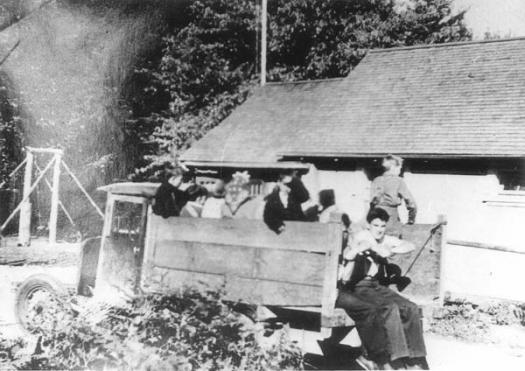|
This photo is proudly displayed in the Cortes Island School because it was our very first school bus.
However, it was also the truck borrowed by the Nakatsui family in 1942 when they were forced to pack up and leave Cortes forever. The Internment of Japanese Canadians is history. No matter how compelling the events, kids seem to have a separate compartment in their brains for "History" and for many, it is not in the same file as "Real life". Finding ways to make the past real for kids can be a challenge. Sometimes it is as simple as taking a group of students out to the picture display in the hallway to show them what they've seen many times: our first school bus. Giggle, chat, point, who's grandpa is that, again? But then, a connection to what we've just been talking about in the classroom - the big nebulous thing called the Internment. This is the truck they packed their house into. This truck. The giggles and chatter stop. They look, silently. Real people. Real story. History. What makes the past real for those of us who didn't experience it? The threads of connection. While I researched this time in the history of Cortes Island, at our museum, I came across a letter from a member of the Nakatsui family, asking for any information about the couple who were interned from Cortes. Where were they sent? Where did they end up? I sat for a long time with that letter in my hands; the tangible evidence of a note in the history books about the "scattering of families". I sat and thought about this family's suffering and about how many other families lost each other, either literally or emotionally. For some reason, I jotted down the contact information of the inquiring family member and tucked it away with my research. A couple of weeks ago, I happened upon it and decided that since the book was now published, I should try and contact this woman. The number and address were several years old. It was a long shot, at best. Yesterday, I reached her. We had a nice exchange and she told me about trying to find out more about her own family history. And it was real all over again. So, why is this so important to me? Because I truly believe in the necessity of remembering for the purposes of learning and evolving. We readily acknowledge that growing up is all about learning from our mistakes. Well, if we have any hope as a species, we'd better learn from our mistakes. I am dismayed to see where we are right now, as fear about terrorism and extremist rhetoric stirs anti-Muslim sentiment in North America. I can only imagine how it feels to be a Muslim Canadian right now. I can only imagine how it felt to be a Japanese Canadian when Imperial Japan attacked Pearl Harbour in December, 1941. I wonder if the silence of the masses was as loud just before the Internment, as it is today.
0 Comments
Your comment will be posted after it is approved.
Leave a Reply. |
Check out Monica's
former blog. Archives
February 2024
|
